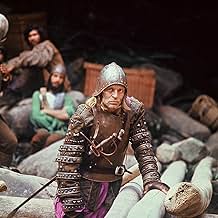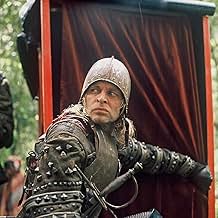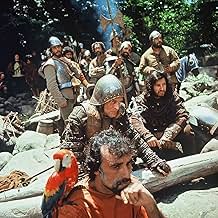IMDb-BEWERTUNG
7,8/10
65.901
IHRE BEWERTUNG
Im 16. Jahrhundert leitet der grausame und wahnsinnige Don Lope de Aguirre eine spanische Expedition, die auf der Suche nach El Dorado ist.Im 16. Jahrhundert leitet der grausame und wahnsinnige Don Lope de Aguirre eine spanische Expedition, die auf der Suche nach El Dorado ist.Im 16. Jahrhundert leitet der grausame und wahnsinnige Don Lope de Aguirre eine spanische Expedition, die auf der Suche nach El Dorado ist.
- Auszeichnungen
- 4 Gewinne & 3 Nominierungen insgesamt
Claus Biederstaedt
- Brother Gaspar de Carvajal
- (Synchronisation)
- (Nicht genannt)
Lothar Blumhagen
- Don Pedro de Ursua
- (Synchronisation)
- (Nicht genannt)
Heinz Theo Branding
- Don Fernando de Guzman
- (Synchronisation)
- (Nicht genannt)
Christian Brückner
- Balthasar
- (Synchronisation)
- (Nicht genannt)
Empfohlene Bewertungen
"Aguirre, the Wrath of God": Werner Herzog is one of my all-time favorite film makers, and this is one of my favorite films by him. Actually taken from the diary of the priest who accompanied Pizarro's expedition in 1560, Herzog recreates the pretentious and self-deluded search for the "Lost City of Gold - Eldorado".
Herzog likes true stories...ones that are bizarre in their own right, but with his direction and personal vision, they become profound (and never optimistic). The camera work is always interesting (he single-handedly "patented" camera shots that don't sweep - they ("you") stare and stare - and stare - at a thing or person or place until it becomes abstract, intense, beautiful, threatening, profound), the scoring is always appropriate yet never expected, and his casting, often using the unique talents of the late Klaus Kinski, guarantee nothing less than an intense experience...even in a film like "Aguirre", which SLOWLY claws and slogs it's way along each and every slippery, dangerous, foreign mile of jungle.
It is clear Herzog 'focuses' on the ridiculously high beliefs humans create for and hold of themselves - that they could actually "own" anything, "conquer" anything, outwit that which they do not understand, and by sheer Will cause anything they deem important, to exist. Herzog is NOT a cheerleader for the history of humans, but he is a ponderer... and we are fortunate he does it on film.
Herzog likes true stories...ones that are bizarre in their own right, but with his direction and personal vision, they become profound (and never optimistic). The camera work is always interesting (he single-handedly "patented" camera shots that don't sweep - they ("you") stare and stare - and stare - at a thing or person or place until it becomes abstract, intense, beautiful, threatening, profound), the scoring is always appropriate yet never expected, and his casting, often using the unique talents of the late Klaus Kinski, guarantee nothing less than an intense experience...even in a film like "Aguirre", which SLOWLY claws and slogs it's way along each and every slippery, dangerous, foreign mile of jungle.
It is clear Herzog 'focuses' on the ridiculously high beliefs humans create for and hold of themselves - that they could actually "own" anything, "conquer" anything, outwit that which they do not understand, and by sheer Will cause anything they deem important, to exist. Herzog is NOT a cheerleader for the history of humans, but he is a ponderer... and we are fortunate he does it on film.
AGUIRRE: THE WRATH OF GOD (1972) Spaniards in search of El Dorado descend down an intense mountain peak with barely a path on it. Men slosh through a wet jungle forest with cannibals, dragging horses, cannons and women on thrones with them. Rafts try to navigate harsh rapids with no end in sight, sending one of them into a whirlpool. This is the first ten minutes. And it is probably easier than what it took to make the film.
Werner Herzog's masterpiece follows Klaus Kinski as a conquistador leading a group of men through his personal madness in Peru, searching for the mythical city of gold. Kinski wasn't an actor, he was a time-traveller, and his performances for Herzog are his best. My favorite scene of all his work is in this film early-on: as the huge group of slaves struggle and burn their souls carrying a woman on a throne-chair against the unforgiving jungle mud and trees, Kinski suddenly appears in the middle to offer a helping hand. He writhes and morphs, grabbing the slaves and shoving them, screaming at the top of his lungs, "Fools!!! The sedan chair is stuck!"
AGUIRRE is what got Herzog noticed around the world as part of a new group of German filmmakers along with Fassbinder and Wenders. His previous film was EVEN DWARVES STARTED SMALL, which resulted in Kinski calling him, "A mere dwarf director." The battles between he and Kinski should be legendary by now. The final result in Herzog stating he will grab his gun and kill both himself and Kinski as the actor was threatening to leave the production. Kinski was convinced and finished the film.
This story and more is part of the excellent analog track by Herzog, covering all of the hardcore production that overwhelms the more famous Coppola problems making Apocalypse Now. Herzog didn't have millions of dollars, rather 300 grand, had to live on the rafts for months and deal with the jungle and Kinski. But he never bitches - you do what you have to do, and the film is never compromised, from the costumes, the beautiful real locations and the boat hanging in the tree to the eerie group of small monkeys at the end (which Herzog had to steal, even though he paid for them). The analog track is constant (many now seem to take pauses to watch the film) with background on the idea, actors, filming and philosophies. Yes, that is a real mummy in the cannibal camp, for which Herzog's brother had to buy a passenger ticket for the plane ride over.
The DVD is another fantastic release giving the nice treatment to a title that can't be making them millionaires. The image looks great and is not letterboxed, so I assume that that is how Herzog prefers it. The three trailers didn't add much to the presentation, but that's a minor point. When they are finished with the entire Herzog collection, it will be one of the most fascinating career studies on DVD.
Werner Herzog's masterpiece follows Klaus Kinski as a conquistador leading a group of men through his personal madness in Peru, searching for the mythical city of gold. Kinski wasn't an actor, he was a time-traveller, and his performances for Herzog are his best. My favorite scene of all his work is in this film early-on: as the huge group of slaves struggle and burn their souls carrying a woman on a throne-chair against the unforgiving jungle mud and trees, Kinski suddenly appears in the middle to offer a helping hand. He writhes and morphs, grabbing the slaves and shoving them, screaming at the top of his lungs, "Fools!!! The sedan chair is stuck!"
AGUIRRE is what got Herzog noticed around the world as part of a new group of German filmmakers along with Fassbinder and Wenders. His previous film was EVEN DWARVES STARTED SMALL, which resulted in Kinski calling him, "A mere dwarf director." The battles between he and Kinski should be legendary by now. The final result in Herzog stating he will grab his gun and kill both himself and Kinski as the actor was threatening to leave the production. Kinski was convinced and finished the film.
This story and more is part of the excellent analog track by Herzog, covering all of the hardcore production that overwhelms the more famous Coppola problems making Apocalypse Now. Herzog didn't have millions of dollars, rather 300 grand, had to live on the rafts for months and deal with the jungle and Kinski. But he never bitches - you do what you have to do, and the film is never compromised, from the costumes, the beautiful real locations and the boat hanging in the tree to the eerie group of small monkeys at the end (which Herzog had to steal, even though he paid for them). The analog track is constant (many now seem to take pauses to watch the film) with background on the idea, actors, filming and philosophies. Yes, that is a real mummy in the cannibal camp, for which Herzog's brother had to buy a passenger ticket for the plane ride over.
The DVD is another fantastic release giving the nice treatment to a title that can't be making them millionaires. The image looks great and is not letterboxed, so I assume that that is how Herzog prefers it. The three trailers didn't add much to the presentation, but that's a minor point. When they are finished with the entire Herzog collection, it will be one of the most fascinating career studies on DVD.
This is neither the masterwork nor the garbage most people see in it. Sure, it has a lot of very strong points - Kinski's acting, a fascinating plot, the original settings, some good cinematography and an unforgettable closing scene. However, the movie seriously suffers from awkward cuts and terrible dramaturgy; and, worst of all, the stiff dialogues and the amateur-class acting of almost everybody besides Kinski (you will note both especially if you speak German) make some scenes unbearable. So all in all, while it may have the potential to be a really great movie, it delivers only sometimes, and in order to call it a masterpiece, you would have to be very generous and overlook many flaws ...
Stunning, dreamlike film documents (in a somewhat documentary style), the story of Don Lope de Aguirre (Klaus Kinski), who leads a group of Spanish conquistadors into the depths of the jungle in search for El Dorado, the mythical city of gold. Beautiful cinematography and locations place the viewer into the heart of the jungle, where they witness firsthand Aguirre's descent into madness. Continually interesting and exciting, it features some of the greatest images ever committed to film, most notably the opening and closing shots of the movie.
10mstomaso
Werner Herzog and Klaus Kinski's masterful achievement - Aguirre: The Wrath of God (Aguirre, der Zorn Gottes) is a rich and powerful film set deep in the the South American rain forest. Ostensibly a piece of historical fiction based on fragmentary evidence concerning one of the many ill-fated attempts to find and conquer the mythic El Dorado (a city of gold rumored to be anywhere from southern Canada to Patagonia), Aguirre operates on so many levels and reflects so many aspects of its story that it is difficult to convey precisely what the film is really about. It is too fictionalized (yet plausible) to fit comfortably in the "historical fiction" shoebox; the dialog is as much a presentistic bit of reflexive thinking as it is fitting for the historical context of the film; and the setting is so breathtaking that without a plot and without the brilliant concept and fantastic acting, the film would still be breathtaking and painful.
The opening scene, which very slowly depicts a caravan of Spanish soldiers, African and South American Indian slaves, burros, horses, cannons, and provisions making their way down a steep mountain path surrounded by miles of rain forest, is breathtaking and ominous, and sets not just the tone, but the pace of the film. Many people will find the pace a little too slow to handle. After a few minutes of struggle, the nobleman leader of the expedition throws in, and appoints a small number of participants to go forward into the jungle. Of these, only Lope Del Aguirre, a career soldier with vast ruthless ambition, and Ursua, a more gentle nobleman, are really leadership material. As the party floats down-river on rafts, it rapidly becomes clear by whose will the party continues on, and who will emerge as its sole leader in the end.
Herzog develops some of his usual themes in this film, and does so with poignancy and cinematography nothing short of beauty. The film is about power, madness, religion, oppression, nature, and culture, but certainly does not stop there. This is film as high art. Brilliantly executed, multi-faceted, moving, and as ambiguous as real life so often is.
This is also one of the great actor Klaus Kinski's most profound and appealing roles. Though Kinski was later typecast in mad, or at least eccentric, roles, as Aguirre he is able to show his range very effectively - because the character varies from a cold, brooding, Machiavellian rationalism to an obsessive sociopathic suicidalism. The rest of the cast rises to the challenge and acts right at Kinski's level, making this film one of the best actors/production team collaborations I have ever seen.
This film is definitely not for everybody, it is a long, slow sip of delicious and yet bitter wine which the typical movie-goer will only appreciate when 'in the mood' for something which requires thought and energy to watch. It is also one of my favorite films of all time.
The opening scene, which very slowly depicts a caravan of Spanish soldiers, African and South American Indian slaves, burros, horses, cannons, and provisions making their way down a steep mountain path surrounded by miles of rain forest, is breathtaking and ominous, and sets not just the tone, but the pace of the film. Many people will find the pace a little too slow to handle. After a few minutes of struggle, the nobleman leader of the expedition throws in, and appoints a small number of participants to go forward into the jungle. Of these, only Lope Del Aguirre, a career soldier with vast ruthless ambition, and Ursua, a more gentle nobleman, are really leadership material. As the party floats down-river on rafts, it rapidly becomes clear by whose will the party continues on, and who will emerge as its sole leader in the end.
Herzog develops some of his usual themes in this film, and does so with poignancy and cinematography nothing short of beauty. The film is about power, madness, religion, oppression, nature, and culture, but certainly does not stop there. This is film as high art. Brilliantly executed, multi-faceted, moving, and as ambiguous as real life so often is.
This is also one of the great actor Klaus Kinski's most profound and appealing roles. Though Kinski was later typecast in mad, or at least eccentric, roles, as Aguirre he is able to show his range very effectively - because the character varies from a cold, brooding, Machiavellian rationalism to an obsessive sociopathic suicidalism. The rest of the cast rises to the challenge and acts right at Kinski's level, making this film one of the best actors/production team collaborations I have ever seen.
This film is definitely not for everybody, it is a long, slow sip of delicious and yet bitter wine which the typical movie-goer will only appreciate when 'in the mood' for something which requires thought and energy to watch. It is also one of my favorite films of all time.
Wusstest du schon
- WissenswertesDuring a particularly rowdy night of production, Klaus Kinski, irritated by the noise from a hut where cast and crew were playing cards, repeatedly fired with a Winchester rifle into it. One of the bullets took the tip of an unnamed extra's finger off. Werner Herzog immediately confiscated the weapon and it remains his property to this day.
- PatzerThe indigenous Peruvians wear clothes that were imported by Europeans in the 19th century.
- Zitate
Don Lope de Aguirre: That man is a head taller than me. That may change.
- Alternative VersionenThe early 2000's DVD release is missing the opening shot (after the text scroll) of the clouds parting to reveal the mountains. It simply opens on the shot following the line of people descending the narrow mountain trail. It also is missing the title credits over the river water. Earlier U.S. video versions were missing these titles as well, but kept the footage so that the film had several seemingly unmotivated long shots of the flowing water.
- VerbindungenEdited into Spisok korabley (2008)
- SoundtracksAguirre, Der Zorn Gottes (Lacrime Di Re)
Written by Florian Fricke
Performed by Popol Vuh
Published by Edition Intro Meisel
Courtesy of Gammarock Music
Top-Auswahl
Melde dich zum Bewerten an und greife auf die Watchlist für personalisierte Empfehlungen zu.
Details
- Erscheinungsdatum
- Herkunftsländer
- Sprachen
- Auch bekannt als
- Aguirre, la ira de Dios
- Drehorte
- Huayna Picchu, Peru(mountain with stone stairway in the opening scene)
- Produktionsfirmen
- Weitere beteiligte Unternehmen bei IMDbPro anzeigen
Box Office
- Budget
- 370.000 $ (geschätzt)
- Weltweiter Bruttoertrag
- 37.794 $
Zu dieser Seite beitragen
Bearbeitung vorschlagen oder fehlenden Inhalt hinzufügen































